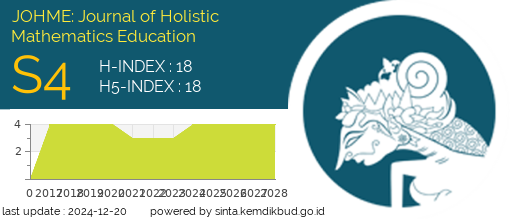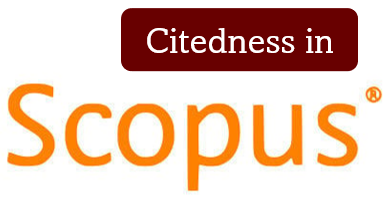THE IMPLEMENTATION OF PROJECT-BASED LEARNING MINI-RESEARCH TASKS ON STUDENTS' LEARNING OUTCOMES DURING THE PANDEMIC
DOI:
https://doi.org/10.19166/johme.v7i1.6137Keywords:
Learning Outcomes, Mini-Research, Covid-19 Pandemic, Project-Based LearningAbstract
Statistics for Research Education is an important course for students in the Faculty of Education. Serious problems are experienced by students learning statistics, one of them is because the learning outcomes are not optimal. To overcome this problem, a lecturer can provide mini-research tasks. Mini-research is one form of assignment from project-based learning. This research was descriptive qualitative research. The subjects in this study were students from Cohort 2019 who took Educational Research Statistics courses. Learning activities and mini-research assignments are handled fully online. By giving students a mini-research assignment, students can be encouraged to learn statistical theories and concepts. Through mini-research tasks, students can increasingly see the big picture and interrelationships between topics in this course. The positive responses can be seen from students’ reflections and results of the review given to the paper. The use of project-based learning with a mini-research task is an interesting idea and suitable for students. In addition to better student learning outcomes, students also become more conscious of the problems around them. Prospective teachers can learn to make research an upcoming provision when they enter the field of teaching.
References
Anggreni, Y., Festiyes, & Asrizal. (2019). Meta-analisis pengaruh model pembelajaran project based learning terhadap kemampuan berpikir kritis peserta didik SMA. Pilar of Physics Education, 12(4), 881-888. Retrieved from https://ejournal.unp.ac.id/students/index.php/pfis/article/view/7912/3726
Arnold, P. (2013). Statistical investigative questions: An enquiry into posing and answering investigative questions from existing data [Dissertation]. Retrieved from https://iase-web.org/documents/dissertations/13.PipArnold.Dissertation.pdf
Asan, A. (2005). Implementing project based learning in computer classroom. The Turkish Online Journal of Educational Technology, 4(3), 68-81. Retrieved from http://www.tojet.net/articles/v4i3/4310.pdf
Astri, K. E., Siburian, J., & Hariyadi, B. (2022). Pengaruh model project based learning terhadap keterampilan berpikir kritis dan berkomunikasi peserta didik. BIODIK: Jurnal Ilmiah Pendidikan Biologi, 8(1), 51-59. https://doi.org/10.22437/bio.v8i1.16061
Basinger, D. (2021). All truth is God’s truth. Christian Scholar’s Review, 51(1), 82-83. Retrieved from https://www.proquest.com/openview/698c4036bcc1d4c6a1df2badd253f97e/1?pq-origsite=gscholar&cbl=48911
Daulae, A. H., Lazuardi, L., & Napitupulu, M. A. (2018). Kajian penerapan tugas mini riset terhadap hasil belajar mahasiswa materi keanekaragaman hayati. Jurnal Pelita Pendidikan, 6(1), 60-64. https://doi.org/10.24114/jpp.v6i1.9305
Direktorat Jenderal Guru dan Tenaga Kependidikan. (2020). Mengenal konsep project-based learning. Retrieved from https://gtk.kemdikbud.go.id/read-news/mengenal-konsep-projectbased-learning
Dirgantoro, K. P. S., Saragih, M. J., & Listiani, T. (2019). Analisis kesalahan mahasiswa PGSD dalam menyelesaikan soal statistika penelitian pendidikan ditinjau dari prosedur Newman. JOHME: Journal of Holistic Mathematics Education, 2(2), 83-96. https://doi.org/10.19166/johme.v2i2.1203
Elkhatat, A. M., & Al-Muhtaseb, S. A. (2021). Hybrid online-flipped learning pedagogy for teaching laboratory courses to mitigate the pandemic covid-19 confinement and enable effective sustainable delivery: Investigation of attaining course learning outcome. SN Social Sciences, 1(5), 1-16. https://doi.org/10.1007/s43545-021-00117-6
Fadli, R. M. (2021). Memahami desain metode penelitian kualitatif. Humanika, 21(1), 33-54. https://doi.org/doi: 10.21831/hum.v21i1. 38075
Fienberg, E. S. (2014). What is statistics? Annual Review of Statistics and Its Application, 1, 1-9. https://doi.org/10.1146/annurev-statistics-022513-115703
Guo, P., Saab, N., Post, L. S., & Admiraal, W. (2020). A review of project-based learning in higher education: Student outcomes and measures. International Journal of Educational Research, 102, 1-13. https://doi.org/10.1016/j.ijer.2020.101586
Haryono, A., & Adam, C. (2021). The implementation of mini-research project to train undergraduate students’ scientific writing and communication skills. JPBI (Jurnal Pendidikan Biologi Indonesia), 7(2), 159-170. https://doi.org/10.22219/jpbi.v7i2.15838
Koparan, T., & Guven, B. (2014). The effect on the 8th grade students’ attitude towards statistics of project based learning. European Journal of Educational Research, 3(2), 73-85. https://doi.org/10.12973/eu-jer.3.2.73
Kurniasari, A., Pribowo, F. S. P., & Putra, D. A. (2020). Analisis efektivitas pelaksanaan belajar dari rumah (BDR) selama pandemi covid-19. Jurnal Review Pendidikan Dasar: Jurnal Kajian Pendidikan Dan Hasil Penelitian, 6(3), 1-8. Retrieved from https://journal.unesa.ac.id/index.php/PD/article/view/10423/4382
Kusumawardana, A. S., & Dintarini, M. (2021). Analisis interpretasi matematis dalam mini riset mahasiswa melalui pembelajaran berbasis riset. JINoP (Jurnal Inovasi Pembelajaran), 7(1), 102-114. https://doi.org/10.22219/jinop.v1i1.2441
Leksono, S. (2016). Pengaruh pembelajaran mini riset berbasis kearifan lokal terhadap kemampuan penguasaan materi biologi konservasi. Proceeding Biology Education Conference, 13(1), 575-578. Retrieved from https://jurnal.uns.ac.id/prosbi/article/view/5836/5222
Leksono, S. M., Dini, S. N., & Ekanara, B. (2020). Pengaruh pembelajaran proyek mini riset terhadap kemampuan menganalisis permasalahan konservasi lingkungan. Biodidaktika: Jurnal Biologi dan Pembelajarannya, 15(1), 70-77. Retrieved from https://jurnal.untirta.ac.id/index.php/biodidaktika/article/view/8203/5512
Mauliddiyah, L., & Wulandari, S. S. (2022). Pengaruh media pembelajaran daring, fasilitas belajar dan motivasi belajar terhadap hasil belajar siswa selama pandemi covid-19 di SMKN 1 Surabaya. Edukatif: Jurnal Ilmu Pendidikan, 4(2), 2213-2227. Retrieved from https://edukatif.org/index.php/edukatif/article/view/2417/pdf
Noviyana, H. (2017). Pengaruh model project based learning terhadap kemampuan berpikir kreatif matematika siswa. Edumath: Jurnal Pendidikan Matematika, 3(2), 110-117. Retrieved from https://ejournal.umpri.ac.id/index.php/edumath/article/view/455/259
Nugroho, A., Jalmo, T., & Surbakti, A. (2019). Pengaruh model project based learning (PjBL) terhadap kemampuan komunikasi dan berpikir kreatif. Jurnal Bioterdidik, 7(3), 50-58. Retrieved from http://jurnal.fkip.unila.ac.id/index.php/JBT/article/download/17428/12388
Nurastanti, Z., Ismail, F., & Sukirman. (2019). Pengaruh lingkungan belajar di sekolah terhadap hasil belajar siswa pada mata pelajaran fiqih kelas XI Madrasah Aliyah Negeri 1 Banyuasin. Jurnal PAI Raden Fatah, 1(1), 41-46. Retrieved from http://jurnal.radenfatah.ac.id/index.php/pairf/article/view/3008/2051
Octaberlina, L. R., & Muslimin, A. I. (2020). EFL students perspective towards online learning barriers and alternatives using moodle/google classroom during covid-19 pandemic. International Journal of Higher Education, 9(6), 1-9. https://doi.org/10.5430/ijhe.v9n6p1
Özhan, Ş. Ç., & Kocadere, S. A. (2020). The effects of flow, emotional engagement, and motivation on success in a gamified online learning environment. Journal of Educational Computing Research, 57(8), 1-26. https://doi.org/10.1177/0735633118823159
Permari, N. W. P. (2016). Pengaruh mini riset terhadap keterampilan proses sains terintegrasi siswa pada materi pencemaran lingkungan. Proceeding Biology Education Conference: Biology, Science, Enviromental, and Learning, 13(1), 312-317. Retrieved from https://jurnal.uns.ac.id/prosbi/article/view/5732/5098
Prabowo, A. (2012). Pembelajaran berbasis proyek untuk meningkatkan pemahaman mahasiswa atas permasalahan statistika pada perkuliahan studi kasus dan seminar. Kreano, Jurnal Matematika Kreatif-Inovatif, 3(2), 82-90. https://doi.org/10.15294/kreano.v3i2.2615
Pratomo, C., & Gumantan, A. (2021). Analisis efektifitas pembelajaran daring terhadap hasil belajar pendidikan olahraga pada masa pandemi covid-19 SMK SMTI Bandarlampung. Journal of Physical Education, 2(1), 26-31. Retrieved from http://jim.teknokrat.ac.id/index.php/pendidikanolahraga/article/view/964/343
Setiawan, J., & Anggito, A. (2018). Metodologi penelitian kualitatif. Sukabumi, Indonesia: CV Jejak Publisher.
Wajong, A. D., Ridwan, R., & Sangi, N. (2020). Efektivitas penggunaan pembelajaran daring edmodo berbantuan quizstar untuk meningkatkan hasil belajar mahasiswa. Attractive: Innovative Education Journal, 2(3), 49-60. https://doi.org/10.51278/aj.v2i3.75
Wardani, E. F., & Kurnia, F. (2019). Analisis kemampuan literasi sains, sikap ilmiah dan merancang mini riset mahasiswa PGSD STKIP Muhammadiyah Bangka Belitung pada mata kuliah praktikum IPA. Primary Education Journal Silampari, 1(1), 13-23. Retrieved from https://ojs.stkippgri-lubuklinggau.ac.id/index.php/PEJS/article/view/308/156
Wichadee, S. (2017). A development of the blended learning model using edmodo for maximizing students’ oral proficiency and motivation. International Journal of Emerging Technologies in Learning (IJET), 12(2), 137-154. https://doi.org/10.3991/ijet.v12i02.6324Downloads
Additional Files
Published
How to Cite
Issue
Section
License
Authors who publish with this journal agree to the following terms:
1) Authors retain copyright and grant the journal right of first publication with the work simultaneously licensed under a Creative Commons Attribution License (CC-BY-SA 4.0) that allows others to share the work with an acknowledgement of the work's authorship and initial publication in this journal.
2) Authors are able to enter into separate, additional contractual arrangements for the non-exclusive distribution of the journal's published version of the work (e.g., post it to an institutional repository or publish it in a book), with an acknowledgement of its initial publication in this journal.
3) Authors are permitted and encouraged to post their work online (e.g., in institutional repositories or on their website). The final published PDF should be used and bibliographic details that credit the publication in this journal should be included.”










